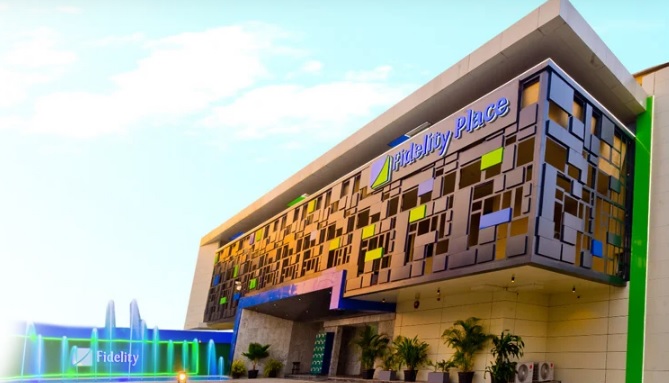Business
Fidelity Bank’s Consistent Strong Growth Excites Investors

Fidelity Bank’s Consistent Strong Growth Excites Investors
Fidelity Bank Plc has recorded an average annual profit growth of 64 per cent over the past three years, underlining its resilience as one of Nigeria’s fastest growing companies.
The bank has also seen rapid expansion in customer base and assets as total balance sheet size leapt from N2.1 trillion to N6.2 trillion, the sixth largest in the Nigerian banking industry. The balance sheet was driven by a hefty total deposit of more than N4 trillion, equally the sixth biggest in the industry.
A review of the audited reports and accounts of Fidelity Bank between 2023 and 2020 showed double-digit growths over the years with cumulative average annual growth rate (CAGR) in earnings, profitability and assets significantly above average industry rate and within the best performance among publicly quoted companies.
Average annual profit growth rate of 64 per cent underscores Fidelity Bank’s fundamental strength as an inflation-hedging investment. The operational growth strengthens the overall return outlook of the bank, which share price has delivered an average annual capital gain of more than 100 per cent in five years at the stock market.
Several experts’ reviews have said the bank’s strong historical performance is a major attraction for its ongoing combined rights and public offer.
Fidelity Bank is offering a rights issue of 3.2 billion ordinary shares of 50 kobo each at N9.25 per share. The bank is also simultaneously offering 10 billion ordinary shares of 50 kobo each to the general investing public at N9.75 per share.
The acceptance and application lists for the rights issue and public offer, which opened on Thursday, June 20, 2024, are scheduled to close on Monday, July 29, 2024. The rights issue has been pre-allotted on the basis of one new ordinary share for every 10 existing ordinary shares held as at the close of business on Friday, January 05, 2024.
Fidelity Bank’s gross earnings rose successively from N206 billion in 2020 to N251 billion, N337 billion and N556 billion in 2021, 2022 and 2023 respectively, representing average annual growth of 39 per cent. Profit before tax has grown consecutively from N28 billion in 2020 to N124 billion in 2023. Profit after tax jumped from N26.65 billion in 2020 to N99.45 billion in 2023. Earnings per share has also grown from 92 kobo in 2020 to N3.11 in 2023, showing the headroom for increased dividends to shareholders.
The bank’s profitability has been driven by continuous increase in market share, a strong commitment to national economic growth with supports for businesses and high customer trust.
Fidelity Bank’s total assets has grown successively from N2.11 trillion in 2019 to N2.76 trillion in 2020 and consecutively to N3.28 trillion, N3.99 trillion and N6.23 trillion in 2021, 2022 and 2023 respectively. Shareholders’ funds have also grown successively from N234.03 billion in 2019 to N273.53 billion, N285.29 billion, N314.36 billion and N437.31 billion in 2020, 2021, 2022 and 2023 respectively.
Total deposit has grown by an average annual growth of 33 per cent from N1.7 trillion in 2020 to N4.02 trillion in 2023. A breakdown underlined a strong customer confidence with low-cost deposit accounting for 97.4 per cent of total deposit.
Low-cost deposit has grown at a faster CAGR of 44 per cent over the period, rising from N1.31 trillion in 2020 to N3.91 trillion in 2023. Savings accounts had also doubled over the period from N424 billion in 2020 to N881 billion in 2023, representing average annual growth rate of 28 per cent.
Fidelity Bank has more than 8.0 million customers, with 5.1 million of these customers on digital channels, underlining the strength of the bank’s robust information and communication technology.
As customers increasingly entrust the bank with their funds, Fidelity Bank has also shown equally aggressive commitment to national economic growth with average annual growth of 32 per cent in net loans.
Net loans have grown successively from N1.32 trillion in 2020 to N1.66 trillion, N2.12 trillion and N3.09 trillion in 2021, 2022 and 2023 respectively. The above average growth in loans shows Fidelity Bank’s famed supports for Nigerian businesses. The bank’s loans portfolio is the fifth largest in the Nigerian banking industry.
A frontline industrialist and a customer of the bank, Dr Kamoru Yusuf, Founder of KAM Holding, said Fidelity Bank has been exceptional in supporting the development of Nigerian companies.
Yusuf, whose group has metamorphosed into a global business conglomerate operating in three countries across two continents, confirmed that KAM Holding has benefited immensely from financial supports from Fidelity Bank.
He said investing in Fidelity Bank will be an investment in the growth of Nigerian economy and companies like KAM Holding, the nation’s largest wholly indigenous metal and steel production company.
He underlined the relationship between increased capital for a business-focused bank like Fidelity Bank and the overall development of the Nigerian economy.
There are strong indications that the bank will sustain its impressive growth record in the years ahead. Already, interim report and account of the bank for the first quarter ended March 31, 2024 showed that the bank started the current business year on stronger footing with three-digit growths across key performance indicators.
The three-month report showed that gross earnings increased by 89.9 per cent to N192.1 billion in first quarter 2024. The bank’s top-line performance continued to be driven by broad-based growths across income lines with interest income rising by 90.7 per cent and non-interest income growing by 84 per cent in first quarter 2024.
Growth in interest income was primarily spurred by a higher yield environment and strong earning assets base, while the increase in non-interest income was led by double-digit growth in account maintenance charges, foreign exchange (forex)-related income, trade, banking services, and remittances, supported by increased customer transactions.
Profit before tax doubled by 120 per cent to N39.5 billion in first quarter 2024 as against N17.9 billion in first quarter 2023. The bank’s performance was driven by expanding market share with total deposit rising by 17 per cent within the three months to N4.7 trillion, compared with N4 trillion recorded at the end of 2023.
The bank also increased its supports for national economic growth with net loans and advances rising by 21 per cent from N3.1 trillion at the end of 2023 to N3.7 trillion by March 2024.
Bank
Alpha Morgan to Host 19th Economic Review Webinar

Alpha Morgan to Host 19th Economic Review Webinar
In an economy shaped by constant shifts, the edge often belongs to those with the right information.
On Wednesday, February 25, 2026, Alpha Morgan Bank will host the 19th edition of its Economic Review Webinar, a high-level thought leadership session designed to equip businesses, investors, and individuals with timely financial and economic insight.
The session, which will hold live on Zoom at 10:00am WAT and will feature economist Bismarck Rewane, who will examine the key signals influencing Nigeria’s economic direction in 2026, including policy trends, market movements, and global developments shaping the local landscape.
With a consistent track record of delivering clarity in uncertain times, the Alpha Morgan Economic Review continues to provide practical context for decision-making in a dynamic environment.
Registration for the 19th Alpha Morgan Economic Review is free and can be completed via https://bit.ly/registeramerseries19
It is a bi-monthly platform that is open to the public and is held virtually.
Visit www.alphamorganbank to know more.
Business
GTBank Launches Quick Airtime Loan at 2.95%

GTBank Launches Quick Airtime Loan at 2.95%
Guaranty Trust Bank Ltd (GTBank), the flagship banking franchise of GTCO Plc, Africa’s leading financial services group, today announced the launch of Quick Airtime Loan, an innovative digital solution that gives customers instant access to airtime when they run out of call credit and have limited funds in their bank accounts, ensuring customers can stay connected when it matters most.
In today’s always-on world, running out of airtime is more than a minor inconvenience. It can mean missed opportunities, disrupted plans, and lost connections, often at the very moment when funds are tight, and options are limited. Quick Airtime Loan was created to solve this problem, offering customers instant access to airtime on credit, directly from their bank. With Quick Airtime Loan, eligible GTBank customers can access from ₦100 and up to ₦10,000 by dialing *737*90#. Available across all major mobile networks in Nigeria, the service will soon expand to include data loans, further strengthening its proposition as a reliable on-demand platform.
For years, the airtime credit market has been dominated by Telcos, where charges for this service are at 15%. GTBank is now changing the narrative by offering a customer-centric, bank-led digital alternative priced at 2.95%. Built on transparency, convenience and affordability, Quick Airtime Loan has the potential to broaden access to airtime, deliver meaningful cost savings for millions of Nigerians, and redefine how financial services show up in everyday life, not just in banking moments.
Commenting on the product launch, Miriam Olusanya, Managing Director of Guaranty Trust Bank Ltd, said: “Quick Airtime Loan reflects GTBank’s continued focus on delivering digital solutions that are relevant, accessible, and built around real customer needs. The solution underscores the power of a connected financial ecosystem, combining GTBank’s digital reach and lending expertise with the capabilities of HabariPay to deliver a smooth, end-to-end experience. By leveraging unique strengths across the Group, we are able to accelerate innovation, strengthen execution, and deliver a more integrated customer experience across all our service channels.”
Importantly, Quick Airtime Loan highlights GTCO’s evolution as a fully diversified financial services group. Leveraging HabariPay’s Squad, the solution reinforces the Group’s ecosystem proposition by bringing together banking, payment technology, and digital channels to deliver intuitive, one-stop experiences for customers.
With this new product launch, Guaranty Trust Bank is extending its legacy of pioneering digital-first solutions that have redefined customer access to financial services across the industry, building on the proven strength of its widely adopted QuickCredit offering and the convenience of the Bank’s iconic *737# USSD Banking platform.
About Guaranty Trust Bank
Guaranty Trust Bank (GTBank) is the flagship banking franchise of GTCO Plc, a leading financial services group with a strong presence across Africa and the United Kingdom. The Bank is widely recognized for its leadership in digital banking, customer experience, and innovative financial solutions that deliver value to individuals, businesses, and communities.
About HabariPay
HabariPay is the payments fintech subsidiary of GTCO Plc, focused on enabling fast, secure, and accessible digital payments for individuals and businesses. By integrating payments and digital technology, HabariPay supports innovative services that make everyday financial interactions simpler and more seamless.
Enquiries:
GTCO
Group Corporate Communication
[email protected]
+234-1-2715227
www.gtcoplc.com
Business
BUA Group, AD Ports Group and MAIR Group Launch Strategic Plan for World-Class Sugar and Agro-Logistics Hub at Khalifa Port

BUA Group, AD Ports Group and MAIR Group Sign MoU to Explore Collaboration in Sugar Refining, Agro-Industrial Development, and Integrated Global Logistics Solutions
Abu Dhabi, UAE – Monday, 16th February 2026
BUA Group, AD Ports Group, and MAIR Group of Abu Dhabi today signed a strategic Memorandum of Understanding (MoU) to explore collaboration in sugar refining, agro-industrial development, and integrated global logistics solutions. The partnership aims to create a world-class platform that strengthens regional food security, supports industrial diversification, and reinforces Abu Dhabi’s position as a hub for trade and manufacturing.
The proposed collaboration will leverage BUA Group’s industrial and logistics expertise, Khalifa Port’s world-class infrastructure, and AD Ports Group’s operational experience. The initiative aligns with the objectives of the UAE Food Security Strategy 2051, which seeks to position the UAE as a global leader in sustainable food production and resilient supply chains. It also aligns with Nigeria’s food production- and export-oriented agricultural transformation agenda, focused on scaling domestic capacity, strengthening value addition, improving post-harvest logistics, and unlocking new markets for Nigerian produce across the Middle East, Asia, and beyond.

Photo Caption: L-R: Kabiru Rabiu, Group Executive Director, BUA Group; Cpt. Mohammed J. Al Shamisi, MD/Group CEO, AD Ports Group; Saif Al Mazrouei, CEO (Ports Cluster) AD Ports Group; Abdul Samad Rabiu, Founder/Executive Chairman, BUA Group; and Steve Green, Group CFO, MAIR Group
Through structured aggregation, processing, storage, and maritime export channels, the partnership is designed to reduce supply chain inefficiencies, enhance traceability and quality standards, and also create a predictable trade corridor between West Africa and the Gulf.
BUA Group—recognised as one of Africa’s largest and most diversified conglomerates, with major investments across sugar refining, food production, flour milling, cement manufacturing, and infrastructure- brings extensive industrial expertise and large-scale operational capability to the venture. MAIR Group will provide strategic support in developing integrated logistics and agro-industrial solutions, creating a seamless platform for production, storage, and distribution.
Abdul Samad Rabiu, Founder and Chairman of BUA Group, said:
“This MoU marks an important milestone in BUA’s international expansion and reflects our long-term vision of building globally competitive industrial platforms. Together with AD Ports Group and MAIR Group, we aim to develop sustainable food production and logistics solutions that strengthen regional supply chains and support the UAE’s Food Security Strategy 2051.”
He further added that, “This partnership represents not just a commercial arrangement but a strategic food corridor anchored on shared economic ambition, resilient infrastructure, and disciplined execution, reinforcing long-term food security objectives for both nations.”
A representative of MAIR Group added:
“This collaboration underscores our commitment to advancing strategic industries in Abu Dhabi and building integrated solutions that reinforce the UAE’s position as a global hub for trade, food security, and industrial excellence.”
A spokesperson from AD Ports Group commented:
“Our partnership with BUA Group and MAIR Group highlights Khalifa Port’s role as a catalyst for high-impact industrial investments. This initiative will enhance regional food security, strengthen global trade connectivity, and support Abu Dhabi’s economic diversification goals.”
This MoU marks a historic collaboration that combines world-class infrastructure, industrial expertise, and strategic vision, setting the stage for a sustainable and resilient food and logistics ecosystem that will benefit the UAE, the region, and global markets alike.
-

 celebrity radar - gossips6 months ago
celebrity radar - gossips6 months agoWhy Babangida’s Hilltop Home Became Nigeria’s Political “Mecca”
-

 society6 months ago
society6 months agoPower is a Loan, Not a Possession: The Sacred Duty of Planting People
-

 society5 months ago
society5 months agoReligion: Africa’s Oldest Weapon of Enslavement and the Forgotten Truth
-

 news6 months ago
news6 months agoTHE APPOINTMENT OF WASIU AYINDE BY THE FEDERAL GOVERNMENT AS AN AMBASSADOR SOUNDS EMBARRASSING








